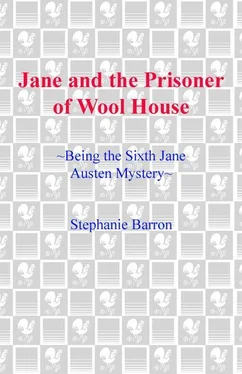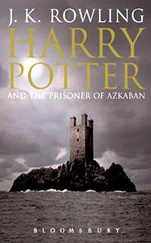Stephanie Barron - Jane and the Prisoner of Wool House
Здесь есть возможность читать онлайн «Stephanie Barron - Jane and the Prisoner of Wool House» весь текст электронной книги совершенно бесплатно (целиком полную версию без сокращений). В некоторых случаях можно слушать аудио, скачать через торрент в формате fb2 и присутствует краткое содержание. Жанр: Исторический детектив, Иронический детектив, на английском языке. Описание произведения, (предисловие) а так же отзывы посетителей доступны на портале библиотеки ЛибКат.
- Название:Jane and the Prisoner of Wool House
- Автор:
- Жанр:
- Год:неизвестен
- ISBN:нет данных
- Рейтинг книги:4 / 5. Голосов: 1
-
Избранное:Добавить в избранное
- Отзывы:
-
Ваша оценка:
- 80
- 1
- 2
- 3
- 4
- 5
Jane and the Prisoner of Wool House: краткое содержание, описание и аннотация
Предлагаем к чтению аннотацию, описание, краткое содержание или предисловие (зависит от того, что написал сам автор книги «Jane and the Prisoner of Wool House»). Если вы не нашли необходимую информацию о книге — напишите в комментариях, мы постараемся отыскать её.
Jane and the Prisoner of Wool House — читать онлайн бесплатно полную книгу (весь текст) целиком
Ниже представлен текст книги, разбитый по страницам. Система сохранения места последней прочитанной страницы, позволяет с удобством читать онлайн бесплатно книгу «Jane and the Prisoner of Wool House», без необходимости каждый раз заново искать на чём Вы остановились. Поставьте закладку, и сможете в любой момент перейти на страницу, на которой закончили чтение.
Интервал:
Закладка:
From the High, we turned into Winkle Street and proceeded to the limits of the town walls. Just beyond where we stood was a platform for viewing the sea and the ships at anchor; to the north ran the Ditches. Beyond the drained moat lay Porter's Mead, an open greensward. Above the mead was a web of small alleys that sprang from Orchard Lane, a narrow thoroughfare running north in parallel to the High. It had received its name long since, and apple trees had given way to buildings of every description.
Our road was of recent construction, and in fairly good repair; but the jumble of houses that lined it on either side was cheap and poorly maintained. It is natural, I must suppose, that the situation of an ancient port such as Southampton — drawing every describable breed and rank to its shores — must encourage such a miscellany of habitation and circumstance. There is poverty in the country, of course; the clergyman of a parish must be intimately acquainted with the humbler forms of suffering, and I had witnessed a good deal of humanity's bleaker side in my youth. But the decay of a city's lower districts is something worse. Here it is not simply a question of want of bread, or of illness brought on the wings of bad weather; here it is a rotting from within: through drink, and violence, and every form of vice.
A woman emerged from a doorway opposite to toss her chamber pot into the gutter. She eyed us malevolently as we passed, and her gaze followed us down the street Three chickens scurried before us, clucking anxiously; a cat trotted by with a fishhead in its mouth. I counted at least three men stretched drunkenly upon the pavement, and was sorry to note that one of them still wore the remnants of a midshipman's dress. From the distance came a high-pitched cackle of laughter, swiftly choked off, and then the wail of a child.
“Poor mite,” murmured Jenny.
Almost every habitation along Orchard Lane was shuttered as yet against the morning. A man's face— dreadful in its haggardness — peered out through one undraped window, and a milk cart drawn by a donkey made its rumbling way along the ruts at the paving's verge. “It is an unsuitable hour for approaching a tavern,” I observed doubtfully, “even did we find the Bosun's Mate. We ought to have waited until sunset, and brought my brother with us.”
“Good mornin', ladies,” said a rough voice behind us. “Lost yer way?”
Jenny started, and clutched at the market basket she carried; I turned with a rustle of skirts. It would not do to show alarm. We should occasion even greater notice than we already had.
“That depends, sirrah,” I replied, “upon the quality of your aid. We are in search of a tavern called the Bosun's Mate.”
He was a man of advancing years, yet still powerful in his frame; his face had been ravaged by pox in his youth, and his right arm was gone below the elbow. His grizzled hair was drawn back in a queue, and tied with a length of black ribbon. He stank of strong spirits, and his eyes were very red.
“We are searching for … my maid's young son,” I added with sudden inspiration. Jenny stiffened beside me. She had never married, and the imputation against her virtue was deeply felt. A lad of fifteen years, whom we believe is lying insensible in a place called the Bosun's Mate. Do you know it?”
“What happened to the young feller then?” our interlocutor enquired, his bleary gaze falling heavily on Jenny. “Run away from home?”
“He were avoiding the Press Gang,” she answered stoutly. “And who wouldn't, I'd like to know?”
“The Press done fer me, in my time,” said the drunkard darkly. “Crying disgrace, it is, the King sending ruffians to cart every able-bodied man and boy off to slave and die at sea. Not that it ain't a good life, mind. I'd be there still, if it weren't fer Boney taking the better part of my arm. But if the lad don't have a taste fer it—”
“He holed up in this here tavern,” Jenny interposed, “but the pore lad were beaten silly by a lout with a grievance. We 'ad a note of the publican, sent to my lady's house bold as brass, and my lady were so good as to lend me her protection. Me being a woman with a reputation to keep.”
I was stupefied by this exercise of wit on Jenny's part, and could only stare at her and await developments. They were not long in coming.
“And could yer man not come in search of the boy?”
“Dead,” she said succinctly. “At Trafalgar/
The drunkard swept off his hat — or the one he imagined to be as yet on his head, but had lost some time since — with a grand gesture of his remaining arm. “Caleb Martin at yer service, good lady,” he informed Jenny. “As who could not be.”
She actually simpered at him. I deemed it time to retrieve the reins.
“Would you be so good as to direct us to the Bosun's Mate?”
“Gladly,” he said, “provided I knew where it was. There's no pothouse o' that name in Southampton, and I've been inside of 'em all.”
Studying his red-veined features, I could well believe the truth of this. I turned to Jenny. “Are you certain that was the name?”
She looked at me helplessly, then nodded. “It's not a common one, like the George, that a body could mistake.”
“No. But a George we might have been certain of finding.” I sighed. “Let us proceed up the street. Perhaps we shall encounter a person better able to assist us than Mr. Martin.”
The fellow attempted to bow, and went sprawling on all fours. I winced at the impact of his poor stump against the paving-stones, but he seemed quite insensible to pain. From his position at our feet, he looked upwards and grinned — a gap-toothed, rather hideous smile that was nonetheless endearing. “Yer boy wouldn't be havin' a joke with yer now, would he?”
“Young Ned is capable of anything,” Jenny told him with resignation. “I almost wish he'd been sent to sea. It might be the making of him — same as yerself, Mr. Martin.”
“I only ask, because o' the name,” he explained.
“The name?”
“The Bosun's Mate. Everyone in Orchard Lane calls old Jeb Hawkins that, on account of it being his station fer thirty year or more. You sure it wasn't a person yer boy meant, and not a public house?”
JEB HAWKINS LIVED IN A TIDY END OF CHARLOTTE Street, with a neat front yard and a kitchen garden set out to one side. He kept a dog, which howled as we approached, and a few guinea fowl. He had evidently been up with the sun, and had been working about his place some few hours. We took courage and introduced ourselves; and rather than setting the dog upon us, he bade us welcome. He was just about to take his morning ration of grog, and would be happy if we might join him.
I should judge the Bosun's Mate to be roughly the age of sixty. A person of his prolonged exposure to the elements can never exhibit an unmarked frame; he was bent from hard labour, and his eyes were creased from gazing perpetually up into the shrouds. It is the boatswain's province on board ship to mind the sails and rigging, and report their condition daily to the first lieutenant; he is in charge, moreover, of all deck activity: the weighing and dropping of anchors, the taking of soundings, and the piping aboard of officers. The silver boatswain's whistle is a badge of honour among the able seamen, the highest distinction they may hope to attain. Frank has often said that a good bosun is worth his weight in Bombay bullion, and much of mutiny may be avoided in a ship that boasts the same.
“Mr. Hawkins,” I began, as Jenny and I perched upon two rattan chairs he had set out on the grass by a small table, “I am uncertain whether we disturb you to any purpose. A young woman — a stranger to us — said that we might find her through the Bosun's Mate. I understand that is how you are sometimes called.”
Читать дальшеИнтервал:
Закладка:
Похожие книги на «Jane and the Prisoner of Wool House»
Представляем Вашему вниманию похожие книги на «Jane and the Prisoner of Wool House» списком для выбора. Мы отобрали схожую по названию и смыслу литературу в надежде предоставить читателям больше вариантов отыскать новые, интересные, ещё непрочитанные произведения.
Обсуждение, отзывы о книге «Jane and the Prisoner of Wool House» и просто собственные мнения читателей. Оставьте ваши комментарии, напишите, что Вы думаете о произведении, его смысле или главных героях. Укажите что конкретно понравилось, а что нет, и почему Вы так считаете.












